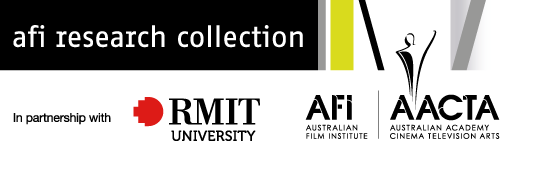
RMIT’s AFI Research Collection is pleased to announce the 2022 AFI Research Collection Research Fellowship.
The AFIRC invites proposals from individuals wishing to undertake research that utilises the Collection’s resources and promotes the AFIRC. We actively encourage applicants who are Aboriginal or Torres Strait Islander, from the CALD (Culturally and Linguistically Diverse) and/or DGSS (Diverse Genders, Sexes and Sexualities) communities and/or people living with disabilities, who meet the requirements of the Fellowship. The Fellowship is designed to showcase the unique holdings of the AFIRC, which include special collections, film stills, newspaper clippings and other significant artefacts from the Australian film and television industry.
The appointed Fellow will have access to the Collection under the guidance of the AFIRC staff.
The Fellowship will provide a stipend of $5,000 (AUD) which includes travel costs if the recipient is not from Melbourne.
The Fellow will be required to participate in an accessible public event that engages on a topic related to their work. This could be in the form of an informal In-Conversation, or a panel style event and will be facilitated by RMIT Culture.
Who can apply for the Fellowship?
The AFI Research Collection Fellowship is open to individuals who have a demonstrated interest and experience in Australian screen culture and research through research outputs or AV outputs.
How do I apply for the Fellowship?
Applications for the AFIRC Research Fellowship will close on 11:55 pm (AEST) Sunday 4 September 2022
General information for applicants
Download the application form here (32Kb .docx)
Subscribe to FilmFile or follow AFIRC on Instagram for 2021 Fellowship updates
Feel free to contact the AFI Research Collection if you have any questions.
Previous winners of AFI Research Collection Fellowship
2021 – James Findlay
Framing the frontier: Australian settler colonialism on television after 1970
2020 – Jessica Balanzategui
Children’s Television Genres in Australia 1960 – 2000 and Changing Paradigms of Quality Child-Appropriate Screen Content: Assessing cultural and policy discourses surrounding paradigmatic shifts in Australian children’s television genre trends
2019 – Whitney Monaghan
Queer Television in Australia: Lesbians, Gays and Bisexuals on the Small Screen from 1970 to 2000
2018 – joint winners
- Mark Ryan
Digging up the history of Australian horror cinema: delineating the interwoven strands of horror, transnational-horror, Ozploitation and Australian Gothic movies from the 1970s to now - Stuart Richards
Queer Outwardly Australian Cinema.
2017 – Alexandra Heller-Nicholas
Hidden in Plain Sight: Australian Women’s Film Criticism, 1980 – 1999
2016 – no award
2015 – Alexia Kannas
Dancing with ghosts in the kingdom of shadows
2014 – joint winners
- Andrew Nette and Dean Brandum
Policing Melbourne’s television mean streets - Kirsten Stevens
From Film Weeks to Festivals
2013 – joint winners
- John Hughes
Filmmakers’ cooperatives in Australia between 1966-1986 - Fincina Hopgood
Australian filmmakers’ use of comedy and autobiography to encourage empathy with mentally ill characters
2012 – Catriona Mills
The writer in Australian television history
2011 – Brenda Weber
Research on Australian reality TV


